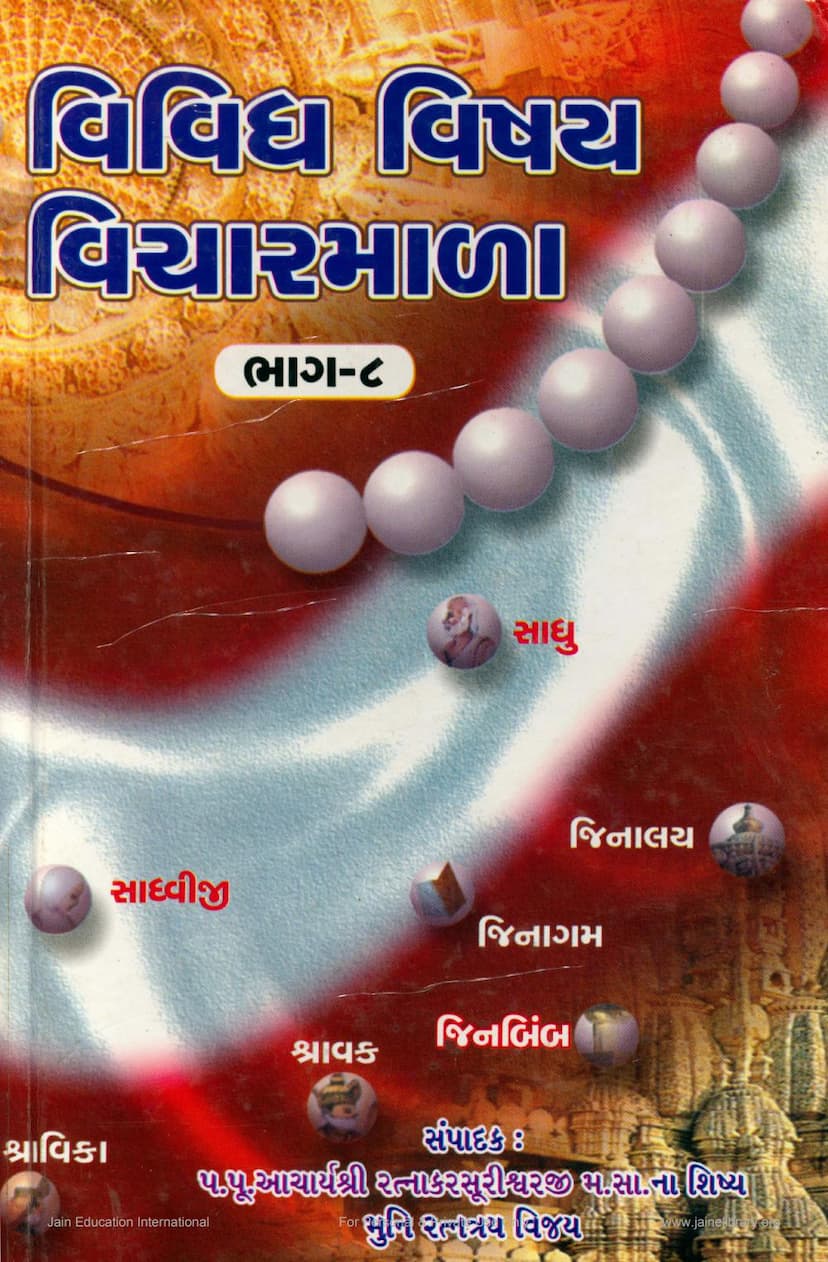Vividh Vishay Vicharmala Part 08
Added to library: September 2, 2025

Summary
The "Vividh Vishay Vicharmala Part 08" is the eighth volume in a series of books titled "Vividh Vishay Vicharmala" (Collection of various subject thoughts), authored by Muni Shri Ratnatrayvijayji Maharajsaheb. It is published by Shri Ranjanvijay Jain Pustakalay in Malwada, District Jalore, Rajasthan.
This particular volume, Part 08, is a compilation of various spiritual and ethical discourses, teachings, and reflections relevant to Jainism. Based on the detailed Table of Contents (Vishayanukramanika) provided, the book is structured as a series of "Updesh" (discourses or teachings), numbering from the first up to the 169th.
The content covers a vast array of topics within Jain philosophy and practice, including:
- The nature of the Divine and Spiritual Hierarchy: Discourses on the forms of Arihantas, Siddhas, Acharyas, Upadhyayas, and Sadhus, including their qualities and classifications.
- Jain Practices and Rituals: Discussions on Jain rituals like Pujas, Samayika, Pratikraman, Paushadh, and various forms of worship and their benefits.
- Ethical Conduct and Virtues: Elaborations on the nature of Devotion, the characteristics of a good disciple, qualities of a Guru, the difference between good and bad Gurus, the importance of shedding negative qualities, and the path to acquiring virtues.
- Cosmology and Jain Philosophy: Explanations of the 24 Tirthankaras, their names and significance, various types of Chaityas (temples/sacred places), and the proper way to perform worship and the nature of Jain idols (Bimba). It also touches upon the concept of Labdhi (spiritual powers) possessed by Munis.
- Social and Behavioral Aspects: The book discusses the essence of a householder (Shravak), their duties, vows (Vratas), the rarity of human birth, the importance of studying scriptures, and the various types of spiritual practices (Svadhyaya, Anushthan).
- Moral and Spiritual Guidance: Discourses on the impermanence of worldly life, the impurity of the body, the suffering of embodied souls, the consequences of actions (sin and punishment), the fruit of controlling senses, the nature of Kashayas (passions), ignorance, the suppression of senses, and the spiritual significance of the Kalpavriksha (wish-fulfilling tree) in the context of Dharma.
- Detailed Explorations of Jain Concepts: The text delves into various concepts such as the twenty-four Tattvas (principles), the importance of introspection, the path to spiritual progress, the characteristics of Noble Dharma, the meaning of Abhay, the nature of wealth and its transience, the essence of Dharma itself, the distinction between good and bad actions, the rewards of performing good deeds, the fruits of good conduct, the superiority of Dharma, and the ten Shravakas of Lord Mahavir.
- Specific Teachings on Vratas and Practices: The book outlines the twelve vows of a householder, the significance of scripture study, and various forms of spiritual discipline and practices.
- The concept of the Five Great Vows (Mahavratas): Detailed explanations of the five Mahavratas, including their intricacies and the difficulty in observing them, as well as the four Purusharthas (goals of life).
- The Cycle of Birth and Death: Discussions on the soul's journey, the suffering in the cycle of existence, and the teachings of detachment from worldly affairs.
- The significance of Rituals and Devotion: The book emphasizes the importance of performing rituals with devotion, the merits of worshiing Jain deities, and the different types of worship.
- Spiritual Authority and Guidance: It highlights the qualities and roles of Gurus in Jainism, the characteristics of different types of spiritual guides, and the importance of following their teachings.
- The concept of auspiciousness and misfortune: The book touches upon the auspiciousness associated with certain actions and the misfortune that can arise from negative conduct.
- The nature of Reality and Illusion: Discourses on the difference between what is real (Sat) and unreal (Asat), and the path to discerning true reality.
- The consequences of actions: The text elaborates on the karmic consequences of actions, including the path to liberation (Moksha).
- Various aspects of Jain cosmology and history: It includes details about the Tirthankaras, their divine attributes (Pratiharyas), the Samavsaran (divine assembly hall), and the auspicious events surrounding the birth of Tirthankaras.
- The significance of various practices: It delves into the detailed descriptions of various spiritual disciplines, the importance of following Jain principles, and the rewards of virtuous living.
- The nature of knowledge and ignorance: The book emphasizes the importance of knowledge in achieving spiritual liberation and the detrimental effects of ignorance.
- Ethical principles and conduct: It covers topics like the importance of humility, truthfulness, non-violence, and the rejection of vices.
- The path to salvation: The text guides the reader on the path to Moksha, emphasizing the importance of righteous conduct, spiritual practices, and the role of knowledge and devotion.
- Examples and Stories: The book is rich with illustrative stories and examples that effectively clarify complex philosophical points and moral lessons.
In essence, "Vividh Vishay Vicharmala Part 08" serves as a comprehensive guide to understanding and practicing the core tenets of Jainism, offering profound spiritual insights and practical guidance for followers. The re-editing and re-publication of this work highlight its importance in disseminating Jain knowledge to a wider audience.